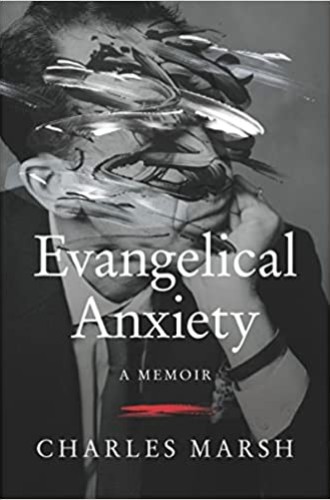Post-evangelical healing
Charles Marsh writes beautifully about the anxiety instilled by his childhood faith—and the therapy it took to overcome it.
Charles Marsh, a professor of religious studies at the University of Virginia who has written a biography of Dietrich Bonhoeffer, a chronicle of his father’s ministry in Mississippi, and a history of Christian organizing in the Jim Crow South, offers in this memoir a searingly honest account of his mental health struggles and his return to a fuller life through therapy and psychoanalysis.
The narrative begins with a description of what he calls his first breakdown, which occurred one night while he was a student at Harvard Divinity School. “How much noise the body makes when amped up on fear! I could hear the hiss of molecules colliding. . . . I heard the sound of collapse. Imagine, if you can, the skid and shatter of the barrier that protects your body from your own imagination.” Deeply shaken, he found himself unable to concentrate for months afterward.
Read our latest issue or browse back issues.
Eventually Marsh connected his anxiety to his upbringing in evangelical Christianity, which demanded constant purity of body, mind, and spirit. His reflections on that type of faith establish “parallel lines of the complete breakdown and my total depravity merging finally into the one either/or: redeemed or damned; pure or impure; all-in or lukewarm; possessed of the mind of Christ or strapped into a white paneled van on the way to Whitfield [the state asylum].” For Marsh, the demands of his childhood faith are simply impossible to fulfill.
Marsh’s nuanced account of the relationship between religion and mental health is a gift. Studies have shown that while religion can improve mental health, certain images of God can be detrimental. Marsh’s story exemplifies how that detrimental impact was rooted in his fears that he could not please God or keep his mind and body pure from sexual thoughts. I often encounter similar anxieties in my work as a chaplain. Many people fear that they are displeasing God with their various imperfections.
Marsh testifies to what many Christians discover: that you cannot pray your way out of an anxiety disorder or profound depression. Christian congregations often have harmful theologies of mental health, and many pastors have egos that prevent them from admitting the limitations of their counseling skills. Readers who have struggled with the sexual purity demands of some forms of Christianity might also be able to relate, especially those who understand themselves as sexual minorities.
As helpful as Marsh’s honesty about his struggles with anxiety are, there are places in the book where I feel like he’s telling us a little too much. Many people suffer from anxiety and from supposedly impure thoughts and could have related to Marsh’s struggles on a general level. We might share the specifics of our fears with a therapist, analyst, or trusted loved one; not all details need to be published.
Still, this is an important book. Marsh combines moving stories, astute but not complicated theological reflection, and hope. He is honest about how anxiety and depression clouded his ability to be a husband, father, and scholar. He notes that the words of his therapist “relieved me of the burden to turn inner torment into a sacrament. The language of the therapeutic hour felt like prayer reciprocated.”
Many Christians in the evangelical world from which Marsh emerged regard therapy as self-indulgent. Others seek out “biblical counselors,” who often instill the same values that caused Marsh so much anxiety. Marsh sees therapy as a gift, even if the process of undergoing it requires time, energy, and sacrifice. Like prayer, therapy helped free him for what scripture calls “life abundant.” He observes, “from analysis I needed reassurance of the capabilities of human being and body and mind, and with that kind of reassurance I could begin again to ponder God, because with that kind of direction I could dream and imagine.” With that kind of direction, Marsh could also begin to pray—to a God who meets us in our fears with grace, love, forgiveness, and hope.
No theologian would claim that therapy or analysis can give us faith. But perhaps they can help us heal past wounds, confront fears, and imagine new possibilities, all of which open our minds and hearts to encounter God’s gracious call to us. If that is true, therapy might be one of the most profound spiritual disciplines of all. We are in Marsh’s debt for his depiction of how he found it to be so.






